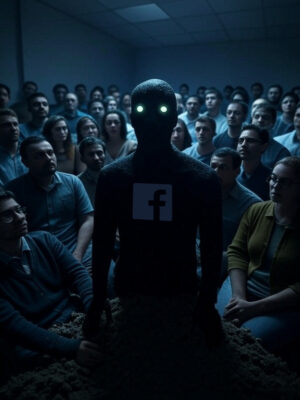Nothing in life is free. This especially applies to social media, search engines, and other mass marketing portals on the internet. “If something is free, you’re the product.” The freemium world of apps and social media have made that phrase nearly indisputable, heralding a previously unimaginable tech panopticon known as “surveillance capitalism.”
“Stay connected,” “Share your story,” “Like what you see.” And so the people do without question. They like. They share. They stay connected. They never log off.
The Facebook algorithm preys on human failure, frailty, rejection, social awkwardness, and like a vulture waits for the right moment to swoop down and pick the flesh off the victims of social media by placing adverts that influence these pitiful specimens to buy, buy, buy.
You are the product, you are the manipulated subject in a monstrous laboratory influenced at the whim of the controllers. The thought that your thoughts are not your thoughts may be terrifying, but it has become common knowledge within the twisted Facebook empire. But then, most great deceits thrive not by hiding themselves, but by offering too much information at once.
In the last decade, a quiet revolution has overtaken the supposed “free world”. Not with tanks nor with treaties, but with devices — silent, blinking, and always listening.
Surveillance capitalism is a new economic order, a new ideology. It is not capitalism as our forebears knew it, but a thing altogether more efficient and more intrusive.
At the centre of this apparatus are vast corporations. Their names are cheery, childlike even: Facebook, YouTube, TikTok, Twitter, Spotify, Netflix. But behind them stands an industry with reach so total, so exquisitely invasive, that not even the mind is private any more. Every glance, every pause, every hesitation is noted, logged, analysed, and sold. The marketplace is no longer for goods. It is for attention, and increasingly, for the human soul.
Social media is a system where adolescent children, often in distress, are observed like lab specimens. When a teenage girl deletes a photograph of herself, the system does not comfort her. It waits — then offers a beauty product. Not by accident, but by design.
Facebook identifies what it calls “moments of psychological vulnerability”, feelings of being worthless, anxious, useless. It is difficult, even for one long inured to cruelty, to conceive of such a thing: not merely watching children suffer, but waiting to turn a profit. The Meta machine thus targets misery with pinpoint precision, and targets the vulnerable to push ads onto them that completely removes any doubt in their minds about buying right now, without delay, without a second thought so they can absolve their human shortcomings.
Inherently evil platforms like Facebook are not just concerned in farming their human cattle for quick purchases but in also being susceptible to being totally socially engineered in all parts of society, including political perception, which truly comes to life in the run-up to elections.
This, then, is the world we inherit. One in which every fear, every insecurity, every flicker of human weakness is not sacred, but marketable. It is not the boot stamping on a human face, forever, it is the algorithm whispering in your ear: “You are not enough. But you might be, if only you buy.”
Today, ads are no longer seen as simple interruptions. They are omnipresent directives, tailored by horrific corporations more intimate with your mind than your own family. Four categories feed this system: your facts (age, sex, habits), your pleasures (songs, jokes, films), your private wanderings (what you do when no one’s looking), and your soul (your fears, desires, weaknesses). All of it, compiled in dossiers without borders or oversight, owned by no nation, sold to the highest bidder.
It is a Party without uniforms, a Ministry without buildings. And like in 1984, resistance is complicated by the fact that participation feels voluntary. The telescreen is now a 6-inch rectangle in your pocket. The Proles post selfies on their own time.
The data industry is worth hundreds of billions, and growing. The young are its raw material. Their inner lives, extracted and sold. It is a machine so vast and so subtle that even its critics are captured by it. Say too much, and your outrage becomes part of the advertising model. Say too little, and it continues unabated.
The monsters have arrived, not with uniforms and banners, but with cheerful interfaces and small-print end-user agreements that no one ever reads.








Social media is evil.
I hate social media. There it is I said it.
Social media has to be one of the biggest psyops in the history of brainwashing.
I rarely go on any social media because I don’t want to be a performing monkey giving away all of my thoughts for free sold crap that I don’t need
What’s the fuss about? Have fun for gawds sake what is this paranoid bollocks?
Zuckerberg is an evil twat.
I never had a Facebook page like all the plebs. Thank the lord I am not a susceptible sheep
Not me mate. I don’t even have a smart phone.